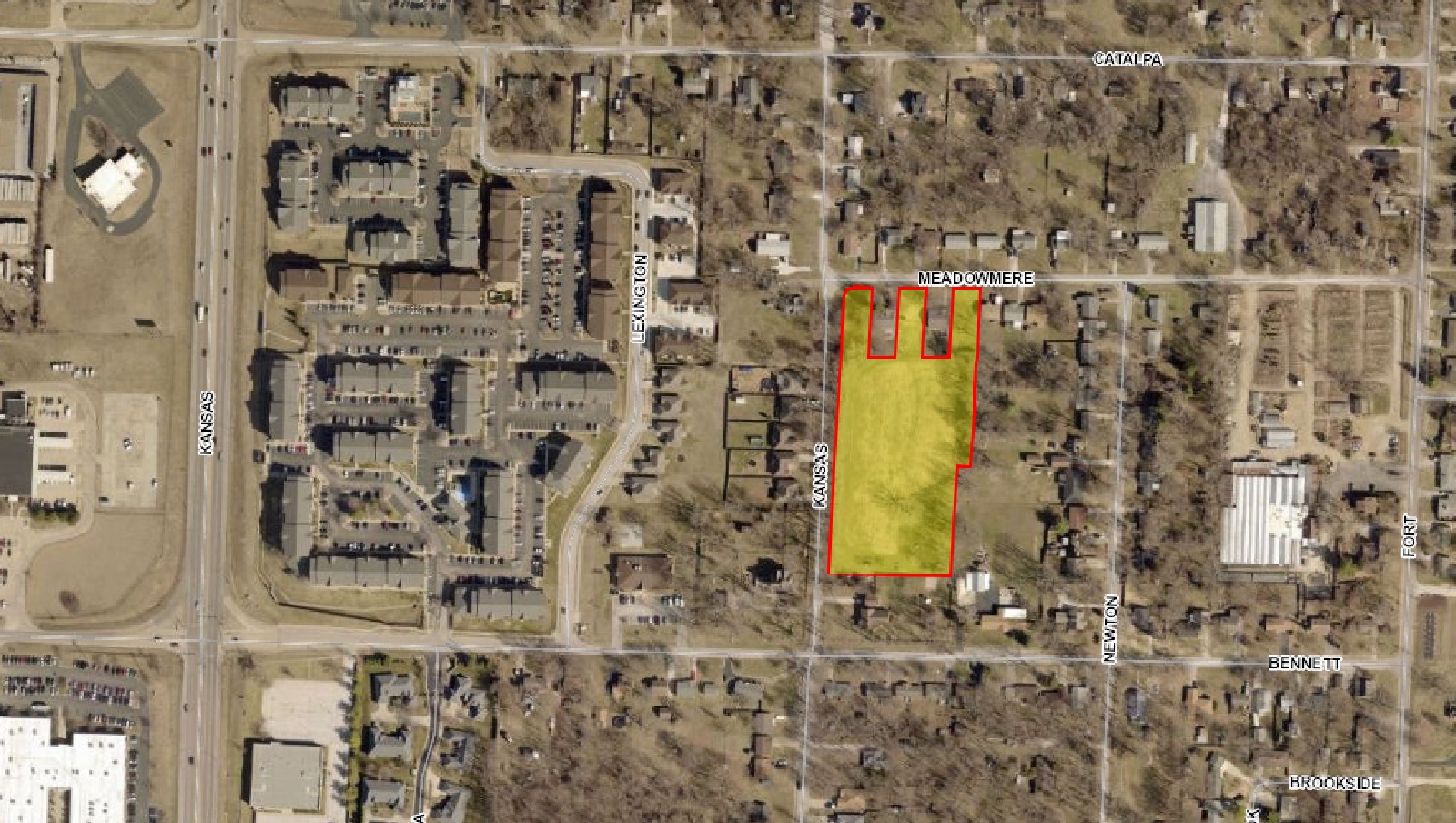A proposed townhouse development has people divided in Springfield's Fassnight neighborhood.
Residents voiced their issues with and support for the project at the Springfield Planning and Zoning Commission’s Feb. 15 meeting. Though empathetic to the concerns raised, the planning commission recommended approval of the rezoning case 7-0, with commissioners Dan Scott and Britton Jobe absent. The City Council will hold a public hearing on the bill on March 11, and take a final vote at a later date.
Supporters spoke highly of the developer, Cameron Eoff, a former Fassnight resident whose family has owned the land in question for 80 years. The supporters believe the project will benefit the neighborhood. Opponents, on the other hand, are concerned about an increase in vehicle traffic, the potential of more crime and light pollution and that the townhomes won’t “fit” the rest of the neighborhood.
What’s being proposed on Kansas Avenue
Eoff, through Eoff Land Trust, is applying to have 3.3 acres of property primarily situated along 1330 S. Kansas Ave. rezoned from single-family residential to low-density multifamily, with specific stipulations required through a zoning mechanism called a conditional overlay. The land is undeveloped, and features an open field with trees around its perimeter. Eoff owns properties to the north and south of the proposed development.
The application proposes a maximum of 33 units on the property — or 11 housing units per acre — and features a “stepped down” approach to make for a smoother transition to the surrounding neighborhood. Low density zoning under Springfield's codes typically allows for up to 18 housing units per acre. The conditional overlay features 17 different conditions, including a building height limit of 30 feet and a set of design requirements.

Though the project didn’t warrant a full study, Springfield traffic engineers estimate the development could result in a 35% increase in traffic. Springfield city staff recommended approval of the rezoning, specifically pointing to the need for more “missing middle” types of housing.
“City staff has used the phrase ‘litmus test’ with us,” Eoff said. “I’m proud to be pushing for something considered a ‘litmus test.’ Can the city take a truly dynamic view of the future for the entire city? Or will it say ‘Not for this neighborhood’ as investment that is begging to pour in, gets shut out. I'm willing to take the risk and I believe it could kick off something special for housing options in this part of the city.”
Some neighbors worried about influx of people and cars
Denis Levangie pleaded for the planning commissioners to vote against the rezoning, arguing the density of the proposed development was too high and the two-lane Kansas Avenue would not be able to handle the increase in traffic.
“Most things don't work when they're put in a small area with great confinement and a lot of expectations,” Levangie said. “It’s just not going to fit.”
Several speakers referred to problems with nearby multifamily developments — including Kensington Park Apartments at 1735 W. Bennett St., Forest Park Townhomes at 1500 W. Grand St. and Eko Park Apartments at 1744 W. Catalpa St. — and suggested Eoff build “ranch-style” homes on the property.
“It just seems like [there’s] a lot of apartments around there,” David Lane said. “Maybe spread them out a little more.”
Emily Logan is concerned over the townhomes’ accessibility to school bus routes.
“I'd really be for this if it was good for community housing, but to try to stuff in more and more complex apartments?” Logan asked, rhetorically.
Developer’s Fassnight roots
Though Eoff no longer lives in Fassnight, his “roots” in the neighborhood are enough to earn the trust of several residents. Dulcy Stewart, who previously worked with Eoff to form the Fassnight Neighborhood Association, is “very excited” about the townhome project.
“I just see the neighborhood sometimes as — that whole part of town is very fragile,” Stewart said. “The least little thing — sometimes I feel it's like at a tipping point, you know, and it could just kind of crumble, and I think that his vision of some really nice townhomes could be just what we need in that part of town.”
Colleen Alexander called Eoff an “excellent neighbor” and commended his vision for the project.
“I think it will improve the neighborhood, and it will be aesthetically pleasing and I think there is a great need for more housing,” Alexander said.
In voicing his support for the rezoning, Planning Commissioner Bruce Colony suggested that Eoff could easily sell the property to someone who could apply for a housing project with a higher units-per-acre density.
“If I lived in a neighborhood, I would feel grateful that the landowner of 80 years was going to do that development with some level of care and consideration for what it's going to leave behind,” Colony said. “If you look at it from that perspective, and have a little faith in the fact that they've lived there, they're going to continue to have property there and they’ve got a stake in this. You’ve got a good developer trying to put in a good development.”
While Commissioner Bill Knuckles acknowledged the concerns raised are “serious,” he agreed that the Eoff’s connection with the neighborhood indicates he will put a serious effort into the development.
Commissioner Natalie Broekhoven said that low-density housing amongst single family residences creates a “dynamic appeal” for neighborhoods.
“I am excited about this litmus test and I hope that the developers are really conscious of what this is going to do for the city moving forward because I do believe that this scale of housing can be easily integrated with little impact on a neighborhood, even single family residential,” Broekhoven said.

